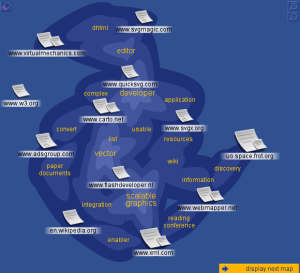
I've been preparing for my next round of Internet Research courses for the Boston University PI program and it's come to mind that two esteemed teaching examples have shut their windows and folded.
The first is Kartoo. Kartoo was the literal interpretation for "connecting the dots." Kartoo was a metasearch visualization tool that ran on Google. That means you could apply Google syntax to Kartoo and get the added bonus of the Kartoo interface doing its magic.
Instead of presenting an endless scroll of countless pages, Kartoo processed the top-cut or highest ranking sites like a clustering tool. Then it displayed your terms as connection points between information sources. It also augmented the referencing of relevant words and phrases between sources. For instance an original story picked up in other places would display primary and secondary sources (and the paths between them).
The second also-ran was Newssift which closed shop after only a year. It was the first websearch that kept and expanded on the promise of sentiment analysis. If you wanted the dirt on a high profile executive Newssift would enable you to do this without soiling for a single adjective. Brilliant. If you want to lament more here's my review of them from last spring.
One of the promises I make my students at the beginning of each cycle is that they've already paid to take the course. There's no double-dipping in subscription fees. The flip-side of course is that these innovative answering machines are at the mercy of a rather dominated and unimaginative business model where Google hegemony is as absolute as the Microsoft/Intel cartel was to the desktop. This is small comfort to BU's instructional designers who are on the verge of publishing outdated curriculum every semester.
However, in the biggest picture this doesn't count as a service disruption or even a broken link. So long as there's more than one answer to a question there will be a reason to improve on existing search technology.


No comments:
Post a Comment